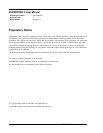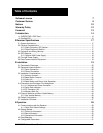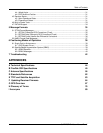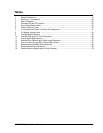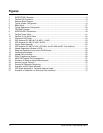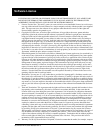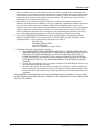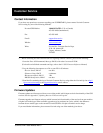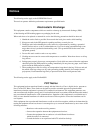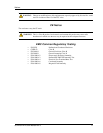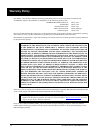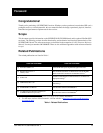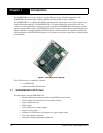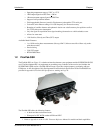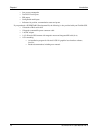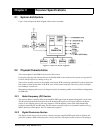
10 SUPERSTAR II User Manual Rev 3
Notices
Notices
The following notices apply to the SUPERSTAR II card.
The receiver operates within the performance requirements specified herein.
Electrostatic Discharge
This equipment contains components which are sensitive to damage by electrostatic discharge (ESD).
A label bearing an ESD marking appears on packaging for the card.
When cards have to be replaced or returned for service the following precautions should be observed:
1. Handle the card as little as possible. Do not touch the leads, pin or tracks while handling.
2. Keep spare cards in the ESD protective packing until they are ready for use.
3. Discharge static before handling the cards (removal or replacement) by touching a grounded
metallic surface such as a rack or cabinet hardware. Use of wrist strap grounded through a one
mega-ohm resistor is preferred when handling cards. (This ground should be the same as the
equipment ground).
4. Do not slide static-sensitive cards over any surface.
5. Clothing must not come in contact with components or assemblies. Wear short sleeves or roll-up
long sleeves.
6. Package parts properly for storage or transportation. Cards which are removed from the equipment
should be placed into ESD protective packing immediately. Do not place any paper, card or other
plastic inside the ESD protective packing.
7. When packing these cards for storage or transportation, keep them in the bag. Fold over and seal
the mouth of the bag to keep out any static generating packing material (for example foamed
polystyrene). Pack around the bag firmly to prevent motion which could generate static.
The following notices apply to the FlexPak-SSII.
FCC Notice
This equipment has been tested and found to comply with the limits for a Class A digital device, pursuant to
Part 15 of the FCC Rules. These limits are designed to provide reasonable protection against harmful
interference when the equipment is operated in a commercial environment. This equipment generates, uses,
and can radiate radio frequency energy and, if not installed and used in accordance with the instruction manual,
may cause harmful interference to radio communications. Operation of this equipment in a residential area is
likely to cause harmful interference in which case the user will be required to correct the interference at his
own expense.
If this equipment does cause harmful interference to radio or television reception, which can be determined by
turning the equipment off and on, the user is encouraged to try to correct the interference by one or more of the
following measures:
• Reorient or relocate the receiving antenna.
• Increase the separation between the equipment and receiver.
• Connect the equipment into an outlet on a circuit different from that to
which the receiver is connected.
• Consult the dealer or an experienced radio/TV technician for help.



